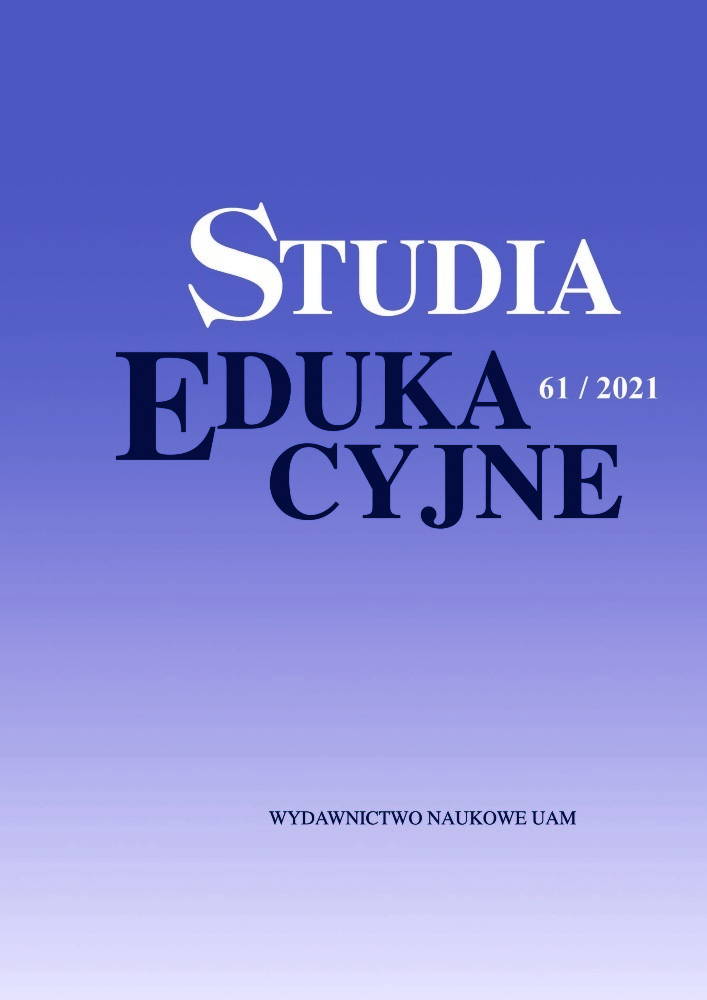Abstract
A single-subject experiment, also known as quantitative case study or n = 1 research design, is an extraordinary but rarely used research method when it comes to education. This method combines precision of experiment with depth of qualitative analyses carried out on the basis of data obtained from a single subject under standardized observation. The paper presents formal characteristics, hypo[1]thesis verification conditions as well as strengths and weaknesses of the five single-subject experiment schemas, i.e.: (1) AB design, (2) reversal design ABAB, (3) multiple baseline design, (4) alternating treatment design, and (5) changing criterion design. Furthermore, graphic and non-graphic methods of testing hypotheses on causal relations between independent and outcome variables appropriate for the single-subject experiment are discussed.
References
Barker J., McCarthy P., Jones M., Moran A., Single-case research methods in sport and exercise psychology, Routledge, New York 2011.
Barlow D.H., Nock M.K., Hersen M., Single case experimental designs: strategies for studying behavior change, Pergamon Press, New York 2008.
Boudewyns P.A., Shipley R.H., Flooding and implosive therapy: direct therapeutic exposure in clinical practice, Springer, New York 2012.
Cash P., Stanković T., Štorga M., Experimental design research. approaches, perspectives, applications, Springer, Zurich 2016.
Cohen J., Cohen P., West S.G., Aiken L.S., Applied multiple regression/correlation analysis for the behavioral science, LEA Publishers, Mahwah, New York 2003.
Coleman R., Designing experiments for the social sciences: How to plan, create, and execute research using experiments, SAGE, Los Angeles 2018.
Duchesne S., McMaugh A., Educational psychology for learning and teaching, CENGAGE Learning, South Melbourne 2015.
Dunning T., Natural experiments in the social sciences: a design-based approach, Cambridge University Press, Cambridge 2012.
Elliot S.N., Witt J.C., Gresham F.M., Handbook of behavior therapy in education, Springer, New York 2013.
Gast D.L., Replication, [w:] Single case research methodology: Applications in special education and behavioral sciences, red. J.R. Ledford, D.L. Gast, Routledge, New York 2014.
Good T., Brophy J., Looking in classroom, Pearson/Allyn and Bacon, New York 2008.
Hayes A., Introduction to mediation, moderation, and conditional process analysis: A regression-based approach, The Guilford Press, New York 2017.
Hong G., Causality in a social world moderation, meditation and spill-over, Wiley, Chichester 2015.
Jasienski M., Wishful thinking and the fallacy of single-subject experimentation, Scientist, 1996, 10(5).
Kazdin A.E., Single-case research designs: Methods for clinical and applied settings, Oxford University Press, New York 1982.
King E.M., Minium, B.M., Statistical reasoning in psychology and education, Wiley, Hoboken 2003.
Mark M.M., Gamble C., Experiments, quasi-experiments, and ethics, [w:] The handbook of social research ethics, red. D.M. Mertens, P.E. Ginsberg, SAGE, Los Angeles 2009.
McBurney D.H., White T.L., Research methods, Wadsworth, Belmont 2010.
Mitchel M.L., Jolley J.M., Research design explained, Wadsworth, Belmont 2009.
Morgan D.L., Morgan R.K., Single-participant research design: Bringing science to managed care, American Psychologist, 2001, 56.
Morgan D.L., Morgan R.K., Single-case research methods for the behavioral and health sciences, SAGE, Los Angeles 2009.
Mozzoni M.P., Hartnedy S., Escape and avoidance hypothesis testing using an alternating treatment design, Behavioral Interventions, 2000, 15.
Pearl J., Glymour M., Jewell N.P., Causal inference in statistics: A Primer, Wiley, Chichester 2016.
Ravid R., Practical statistics for educators, Rowman & Littlefield, Lanham 2014.
Sheldon B., Cognitive-behavioural therapy: Research and practice in health and social care, Routledge, New York 2012.
Tatrow K., Montgomery G.H., Cognitive behavioral therapy techniques for distress and pain in breast cancer patients: A meta-analysis, Journal of Behavioral Medicine, 2006, 29.
Vanderwelle T.J., Explanation in causal inference. Methods for mediation and interaction, Oxford University Press, Oxford 2015.
Vargas J.S., Behavior analysis for effective teaching, Routledge, New York 2009.
Velleman S., Stallard P., Richardson T., A review and meta-analysis of computerized cognitive behaviour therapy for the treatment of pain in children and adolescents, Child: Care, Health and Development, 2010, 36.
Weathington B.L., Cunningham C.J., Pittenger D.L., Research methods for the behavioral and social sciences, Wiley, Hoboken 2010.

